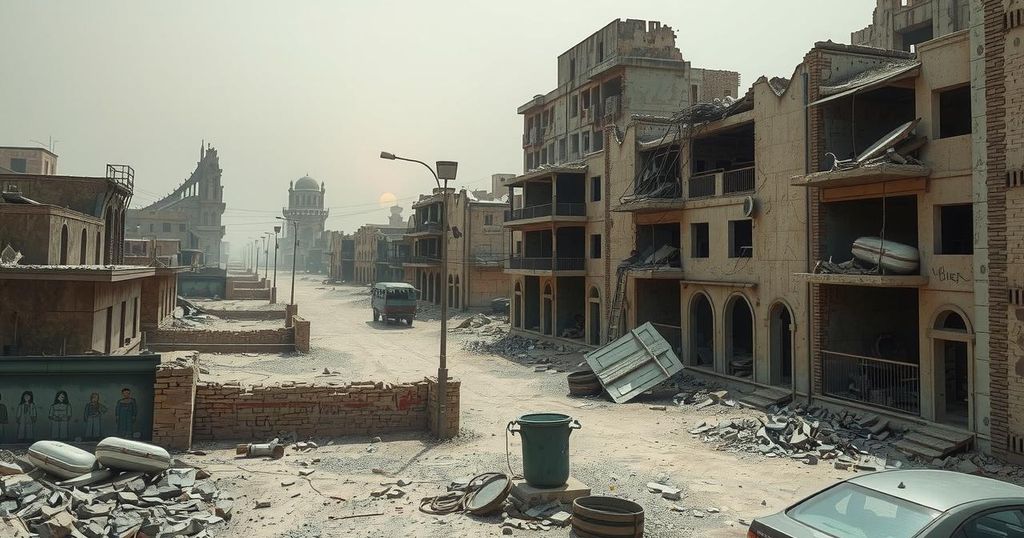The Current Humanitarian Crisis in Sudan: Challenges and Insights

The article discusses the recent recapture of Khartoum by Sudan’s Armed Forces amid a humanitarian crisis. Local responders play a crucial role in aid efforts, yet their safety remains jeopardized. The Rapid Support Forces continue to exert influence in Darfur, raising concerns over ongoing conflict. The need for effective international engagement and humanitarian assistance is urgently highlighted.
Recent developments in Sudan have seen the de-facto military ruler visit the presidential palace in Khartoum, following the recapture of the city from rival paramilitary forces. The impact of this event on the ongoing conflict, which has severely affected the nation since April 2023, is yet to be determined.
Khartoum, previously one of East Africa’s burgeoning capitals, is now desolate, with its residents displaced and infrastructure devastated. Aid worker Mathilde Vu remarked on the tragedy of widespread hunger impacting numerous individuals in a region once known as the “breadbasket of East Africa.”
Vu emphasized that the humanitarian response in Khartoum primarily relies on grassroots initiatives. “Local responders are the one hope of Sudan,” she stated, illustrating their tireless efforts to organize evacuations, manage soup kitchens, and restore essential services, despite limited resources.
These grassroots efforts face increasing danger, with reports indicating the deaths of at least ten local responders amid recent hostilities. Vu expressed that the closure of a single soup kitchen could leave numerous families without food, highlighting the fragile nature of humanitarian support.
The Sudanese Armed Forces (SAF) have recently asserted control over critical locations, such as the presidential palace and central bank, having displaced the Rapid Support Forces (RSF). Despite these achievements, questions arise regarding their potential to foster stability and reconstruction in Khartoum.
Political scientist Abiol Lual Deng cautioned against assuming that SAF’s regained control signifies a new beginning for the city. She noted the dire humanitarian circumstances, as essential services remain disrupted, and expressed doubt over whether stability could be restored.
Deng anticipated that the SAF’s regaining of vital areas may lead to some humanitarian assistance returning, but recognized that the scale of need is vast, with two-thirds of the Sudanese population requiring aid.
The damage inflicted upon Khartoum’s infrastructure is particularly severe due to the city’s economic significance. Its paralysis has far-reaching implications for Sudan and its economy. The SAF’s capability to maintain order will heavily rely on restoring vital services.
Dallia Abdelmoniem, an expert in civil society networks, observed that many displaced individuals are choosing to return to their neighborhoods despite the absence of security. She mentioned that many Sudanese cannot afford to postpone their return and will have to depend on civil society initiatives to fill the void.
Although SAF has made territorial progress, assessment of the overall situation reveals that suggesting a conclusion to the conflict may be premature. The RSF has retreated to Darfur, yet continues to maintain influence, operating as a parallel authority.
Deng warned that the RSF retains significant power and is unlikely to relinquish its base in Darfur. She highlighted the group’s historical role in instigating unrest, cautioning that the SAF’s territorial gains might lead to further military aggression instead of meaningful negotiations.
The humanitarian situation remains dire for civilians, particularly in areas like Al-Fasher and Zamzam, where families risk their safety to escape under precarious conditions. Access to such regions continues to be severely restricted, further compounding the crisis.
International humanitarian organizations persist in their efforts to assist, often relying on neutrality to navigate the conflict. However, the overall international response to the crisis in Sudan has faced criticism for being insufficient, both in scope and effectiveness.
Vu stressed the necessity of humanitarian access, observing that debates over political resolutions are irrelevant to those suffering from starvation. “Aid should have no side,” she asserted, emphasizing the importance of continuous support amid the ongoing conflict.
The internal dynamics of the SAF remain in question, as fractures in leadership have been noted, leading to predictions of a power vacuum within the military forces. A historical context reveals that the SAF and RSF have not always been adversaries, having previously collaborated on operations in Darfur.
Deng posited that multiple global powers are increasingly influencing the Sudanese conflict, raising questions about the extent of Sudan’s agency in its current war. With a pivotal geographical location, Sudan’s manufacturing capabilities position it as a focal point for regional interests.
As conditions in Khartoum remain uncertain, the SAF’s recovery of the city does not equate to a peaceful resolution. Civilians continue to navigate their shattered communities, and the broader conflict persists, with political solutions remaining elusive. Vu concluded by urging the international community to intensify pressure on the involved factions, warning that without sufficient engagement, civilians would endure the consequences.
In summary, the recapture of Khartoum by the Sudanese Armed Forces marks a significant moment in the ongoing conflict, yet does not guarantee stability or a resolution to the humanitarian crisis faced by the population. Local grassroots organizations serve as pivotal lifelines, providing essential support despite significant risks to their safety. The RSF’s continued influence in Darfur poses ongoing challenges, leading to concerns over potential escalations in violence. The international community’s response will be critical in determining the future of both Sudan and its civilians, emphasizing the need for urgently required humanitarian assistance, regardless of the political landscape.
Original Source: www.arabnews.com








